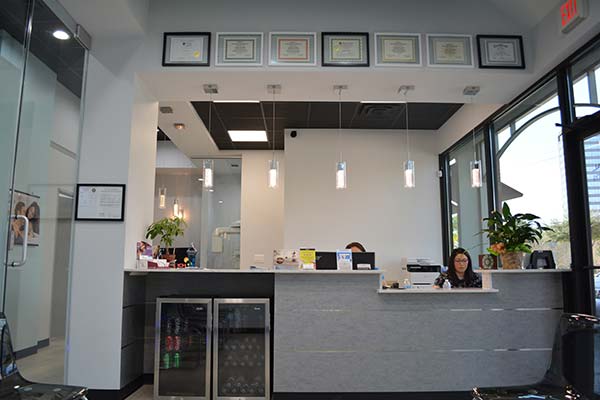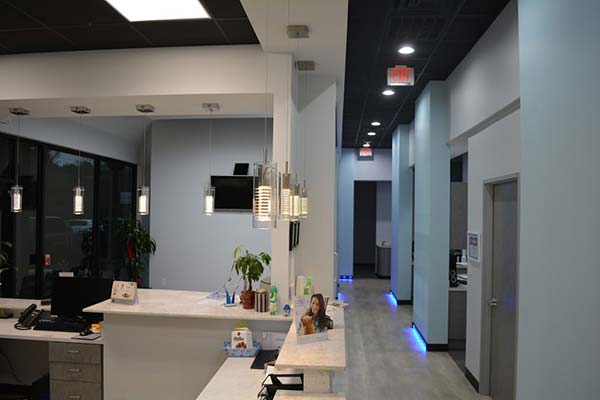Sleep plays an important role in your life. It is a restorative process that allows your body not only to rest, enabling you to heal and restore both physically and mentally. In addition to getting enough sleep at night, it is important that you get quality sleep. If the quality of your sleep suffers, you can be left feeling utterly exhausted in the morning, like you never went to bed in the first place no matter what time you went to bed.
While many people experience a bad night of sleep from time to time, millions of Americans deal with waking up extremely exhausted morning after morning. According to an estimate, about 22 million American have some form of sleep apnea. If this sounds like you, you may be living with a condition known as sleep apnea. Edge Dental can help.
Sleep Apnea
Sleep plays an important role in your life. It is a restorative process that allows your body not only to rest, enabling you to heal and restore both physically and mentally. In addition to getting enough sleep at night, it is important that you get quality sleep. If the quality of your sleep suffers, you can be left feeling utterly exhausted in the morning, like you never went to bed in the first place no matter what time you went to bed.
While many people experience a bad night of sleep from time to time, millions of Americans deal with waking up extremely exhausted morning after morning. According to an estimate, about 22 million American have some form of sleep apnea. If this sounds like you, you may be living with a condition known as sleep apnea. Edge Dental can help.
Are you struggling to get a good night’s sleep?
Do you wake up tired in the morning? You may be suffering from sleep apnea.
Book your appointment online.
What Exactly is Sleep Apnea?
When you sleep, your body goes through two different cycles. These cycles repeat several times during the course of the night, helping your body to rest and repair itself. Completing these cycles is crucial to ensuring that your body gets the rest that it needs. When you have sleep apnea, though, your breathing stops for several seconds during sleep. This causes your body to wake up partially, which jumpstarts your breathing again. When you fall back asleep, your body has to restart the sleep cycles all over again. These pauses in your breathing happen several times throughout the course of the night, making it impossible for your body to complete the necessary sleep cycles. As a result, you wake up feeling like you never went to sleep in the first place.

What Exactly is Sleep Apnea?

When you sleep, your body goes through two different cycles. These cycles repeat several times during the course of the night, helping your body to rest and repair itself. Completing these cycles is crucial to ensuring that your body gets the rest that it needs. When you have sleep apnea, though, your breathing stops for several seconds during sleep. This causes your body to wake up partially, which jumpstarts your breathing again. When you fall back asleep, your body has to restart the sleep cycles all over again. These pauses in your breathing happen several times throughout the course of the night, making it impossible for your body to complete the necessary sleep cycles. As a result, you wake up feeling like you never went to sleep in the first place.
Do you snore while you sleep? Speak to our dentist to see if sleep apnea treatment is the right option for you.
Book now.

Understanding Sleep Apnea
Sleep apnea ranges in severity. With mild sleep apnea, you have 5 to 14 apneic events per sleeping hour. With severe sleep apnea, you suffer 30 or more apneic events per hour. With your sleep disrupted so much, it is no wonder you wake up feeling incredibly tired. There are three types of sleep apnea.
• Obstructive – Obstructive sleep apnea is the most common form, which is caused when your tongue or other oral tissues fall back over the throat and block your upper airway.
• Central – Central sleep apnea occurs when there is a failure of communication between your brain and your breathing muscles to ensure rhythmic breathing cycles.
• Mixed – Mixed sleep apnea is a combination of obstructive sleep apnea and central sleep apnea.
Understanding Sleep Apnea

Sleep apnea ranges in severity. With mild sleep apnea, you have 5 to 14 apneic events per sleeping hour. With severe sleep apnea, you suffer 30 or more apneic events per hour. With your sleep disrupted so much, it is no wonder you wake up feeling incredibly tired. There are three types of sleep apnea.
• Obstructive – Obstructive sleep apnea is the most common form, which is caused when your tongue or other oral tissues fall back over the throat and block your upper airway.
• Central – Central sleep apnea occurs when there is a failure of communication between your brain and your breathing muscles to ensure rhythmic breathing cycles.
• Mixed – Mixed sleep apnea is a combination of obstructive sleep apnea and central sleep apnea.
If your sleep apnea is left untreated, it can result in many health problems such as heart failure, heart attacks or diabetes.
Schedule your appointment now.
What are the Symptom of Sleep Apnea?
Waking up exhausted day after day is just one symptom of sleep apnea. However, it is one of the most common symptoms. The symptom of sleep apnea may vary depending upon the types and severity of the condition. Here’s what can happen as a result of sleep apnea:
• Snoring – this is because of the obstruction of the airway during sleep. When you snore, you also tend to keep your mouth open. Also, snoring loudly creates further disturbance in your, and your partner’s sleep.
• Waking up with a dry or sore throat – when the airway is blocked, people with sleep apnea are forced to breath through the mouth. As a result, there’s a feeling of dry mouth or sore throat when you wake up.
• Feeling excessively tired throughout the course of the day – if you feel tired after waking up every day, you should seek dental treatment or medical help right away.
• Falling asleep during the day – this can happen even while working or while performing tasks that require significant attention such as driving.
• Difficulty concentrating on tasks – due to insufficient rest and sleep
• Irritability
• Trouble controlling your emotions.
Untreated sleep apnea can also have a serious impact on your physical health. Sleep apnea can lead to issues such as hypertension, heart disease, diabetes, low blood oxygen levels, and more.
Do you suffer from daytime fatigue? You may be suffering from sleep apnea.
Schedule your appointment now.
Diagnosing Sleep Apnea
Sleep apnea is diagnosed through a sleep study. This is usually done in a sleep lab, although it may be possible to complete a modified study from the comfort of your own home. Before you go to sleep, you will be hooked up to machines that monitor your vitals, your breathing, your muscle movements and your sleep pattern. These machines record this information, which is then interpreted by a sleep specialist. The specialist, who specializes in sleep medicine, can diagnose sleep apnea or other sleep-related disorder, and formulate an appropriate treatment plan to fix your problem in consultation with our dentists.

Diagnosing Sleep Apnea

Sleep apnea is diagnosed through a sleep study. This is usually done in a sleep lab, although it may be possible to complete a modified study from the comfort of your own home. Before you go to sleep, you will be hooked up to machines that monitor your vitals, your breathing, your muscle movements and your sleep pattern. These machines record this information, which is then interpreted by a sleep specialist. The specialist, who specializes in sleep medicine, can diagnose sleep apnea or other sleep-related disorder, and formulate an appropriate treatment plan to fix your problem in consultation with our dentists.
Sleep apnea can cause many health issues.
Schedule your appointment now.
How is Sleep Apnea Treated?
There are a variety of different treatments available according to the form of sleep apnea your having. These treatments include
• Weight loss – if there is a family history of obesity or high blood pressure, there are higher chances of developing sleep problems like apnea. Reducing weight can be very helpful in getting your sleep back.
• Positive Airway Pressure Device (C-PAP) – This is a machine that delivers a constant flow of air through a small mask worn over your nose and helps in keeping your airway open.
• Mouthguards – An occlusal or night guard. This is a specially made oral device that helps to keep your jaw in proper alignment. This keeps tissues from blocking your airway and also prevents your natural teeth from damage, particularly if you grind your teeth during sleep.
• Oral surgery – Oral surgery may be recommended in severe cases.
• Jaw Repositioning Appliances – These appliances are given by dentists to re-align the position of jaws in a way that you can breath easily and your airway remains open.
You can learn more about the treatment of sleep apnea by visiting the website of National Sleep Foundation.
Sleep apnea, if untreated, can be very harmful to your health and quality of life. However, the good news is that it can be treated. With effective treatment, you can finally get the quality sleep you need to wake up feeling rested, refreshed, and ready to tackle the day ahead. For more information, and to schedule your consultation, call Edge Dental today at (281) 940-8940.
Visit Our Dental Office in Houston
Edge Dental Houston is a state-of-the-art dental office led by one of the best dentists in Houston. Our dental clinic is located in one of the most convenient parts of Memorial City — 15455 Memorial Dr #400 Houston. Our dental clinic is right beside the Katy Freeway and a short walk from some of the city’s most iconic landmarks, including the Bear Creek Pioneers Park and George Bush Park. If you’re looking for a conveniently located dentist’s office near me, you’ve come to the right place. Please schedule an appointment at our dental office in Houston or call (281) 940-8940.

